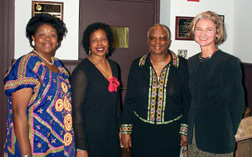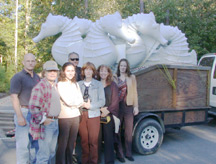
|
Dock of the Bay
Brushing up after Isabel
10,000-ton pile still growing
 |
photos by Sonia Linebaugh
It took three photographs to capture the size of the brush pile that’s accumulated at the Sudley Landfill in the wake of Isabel. |
The howling winds have faded from memory, the waters have receded, but the cleanup from tropical storm Isabel goes on and on.
At Sudley Landfill, pickup trucks and cars with trailers heap load after load onto a huge pile of brush. A yellow bulldozer compacts the pile hour after hour. Grinders turn brush to mulch in a second huge pile.
Father and son Frank Lassalle senior and junior of Lothian recently swung their second trailer load of brush onto the edge of the pile.
“I’ve chain-sawed, cut, loaded and unloaded for days,” Lassalle Jr. said.
That’s despite his father’s decision to keep most of the brush. “The birds will like it this winter,” said senior, whose Isabel problems mounted to more than a few: “The shingles blew off. The siding blew off. Trees fell down. But I can’t feel bad. My sister over in Oxford had a lot of water in her one-story house.”
Less philosophical was Priscilla King, “a farm girl from the middle of nowhere.”
“I’m tired of doing the county’s job,” she complained as she flung brush in the direction of the pile. “I’m going to send her [County Executive Janet Owens] a bill.”
She’ll just be wasting her time.
“People are responsible for cleaning up their own debris, branches and trees on private property,” said county spokesperson Matt Diehl.
Counties are responsible for clearing streets and county right-of-ways, which, said Diehl are part of the “number-one priority: public safety.
“County crews were at work before and during the storm and continue the work,” he said. “All Waste Management Services employees, including management and administrative employees, were asked to work on the busy weekends since the storm. A handful of temporary employees was added to the staff.”
As Isabel blew in, county waste management staff prepared the yards for anticipated wind and storm-water runoff. Yards were closed on Friday, September 19, as flood waters surged, but staff reported voluntarily to clean up and to prepare for being inundated with brush and other storm-related debris.
“Had staff not taken these actions in advance, our customers, as well as nearby traffic conditions, would have been seriously impacted,” said Diehl.
As soon as Isabel blew by, citizens were indeed swarming the Anne Arundel trash and recycling yards at Sudley, Glen Burnie and Millersville. For the first nine days after the storm, September 20 to 28, the yards were open 12 hours a day. During those days, 40,800 customers — twice the usual average — carried in Isabel’s mess. Sudley alone served 7,600 customers with an all-time high of 2,721 on Saturday, September 21. That’s almost 2,200 more vehicles than the usual daily average of 525. In the days since Isabel, brush piles have mounted to 10,000 tons.
“Citizens responded admirably to our request to separate their tree debris from their construction and demolition debris — processed wood, furniture, carpet, pilings, decking and so on — and their appliances. As a result, all the tree debris and appliances are being recycled instead of disposed in a landfill,” said Diehl.
Ten thousand tons of brush recycles into a lot of mulch, which is yours free for the loading daily from 8am to 4pm at Millersville Landfill, off Rt. 32 at 389 Burns Crossing Road: 410/222-6177.
— Sonia Linebaugh
to the top
It’s Official!
Volvo Ocean Race Sails to Chesapeake Country in 2006
Now we’ve gone and done it — on Tuesday, October 7, 2003, Baltimore and Annapolis were officially announced as the only United States stopover for the 2005-2006 Volvo Ocean Race.
The Volvo Ocean Race is one of the two premiere sailing competitions in the world and is a huge deal for ports and cities selected as hosts.
“This is a great investment for the state. It’s a chance to showcase and market great cities and a great event,” said Gov. Robert Ehrlich. The revenue generated will be allocated to helping improve the Bay.
“Monies from the race will go toward water quality to improve the Chesapeake Bay,” added Ehrlich.
In Isabel’s wake, the Bay could use more help.
“We all saw [on Australian television] what Hurricane Isabel did to Annapolis. The way you bounced back from the affects of Isabel reaffirmed our confidence for choosing this region as a stopover in the Volvo Ocean Race,” said Glenn Bourke, CEO of the Volvo Ocean Race.
 |
photo courtesy of Volvo Ocean Race
Come spring of 2006, the yachts of the Volvo Ocean Race will again ply Chesapeake waters. |
This around-the-world sailing spectacle has come to Baltimore and Annapolis twice before, most recently in April 2002. Annapolis will also have its own racing team, Team Kan-Do.
“Team Kan-do will have a global, co-ed crew with a blending of professionals and non-professionals,” said John Alden, leader for Team Kan-do. “We will use professionals in certain slots like tactician and helm, but we will be looking for people who are at the top of their sailing peak who may not have ocean racing experience,” said Alden.
Sailing and professional resumes can be submitted over the Web — www.kan-do.com — after the U.S. Sailboat Show cruises out of Annapolis.
For less experienced sailors wanting to race, there is hope. Alden said they will be looking for people with other backgrounds. Sailors with a medical background will be given every opportunity to make the crew.
Winning will be the team’s main goal, but not the only one.
“We are looking to blow Chessie’s numbers out of the water,” said Alden, referring to Annapolis’ previous yacht to race in the competition, Chessie.
Improving upon a good thing is a target for Volvo Ocean Race in 2005-2006.
“We want to re-invigorate the race and make it commercially viable for the host ports and cities,” said Bourke. Changes made for the next edition of the race revolve around the vessels and stopovers.
Although the Baltimore and Annapolis stopover will be the same, the boats will be different.
“We’re using a new design, the Volvo Open 70. The boats will be longer and faster, enabling the fleet to finish 20 to 22 days quicker than last time,” said the Volvo Ocean Race’s Bourke.
Education will also get more play in the next race. Along with a diverse crew, scientific instruments will be aboard the vessels to record weather data and other information, which schools nationwide will be able to interpret and analyze in the classroom.
“The initiative is meaningful to the next generation of explorers,” said Mary Cleave, a former shuttle astronaut now speaking for NASA’s Office of Earth Science, an education partner with the Volvo Race.
You can explore the Volvo Ocean Race from beginning to end on-line, and in person as it sails into Chesapeake Bay in 2006.
— James Clemenko
to the top
On the Shoulders of Heroes
Anne Arundel Women honored in the tradition of civil rights fighter Fannie Lou Hamer
“I am standing here on the shoulders of Mrs. Fannie Lou Hamer, where my vote in this country counts,” said Modestine T. Wesley, one of six women honored this week at Banneker-Douglass Museum on Haner’s 86th birthday.
Fannie Lou Hamer is not a household name like Rosa Parks, Martin Luther King, Malcolm X and Justice Thurgood Marshall. But these men and women were her contemporaries. They fought together for human and civil rights.
Hamer traveled the roads of her native Mississippi with Martin Luther King to let freedom ring. She challenged whites of the Democratic Party and helped form the Freedom Democratic Party.
 |
photo by Kimberly Goode
This year’s annual Fannie Lou Hamer Women of Excellence award winners: Christine S. Davenport, Sheila Frazier, Modestine Wesley and Mitzi Bernard. |
Hamer was famous for saying, “I am sick and tired of being sick and tired.” One of 22 children of a sharecropper, Hamer visited a doctor as a little girl for what was then called female problems. Nearly 20 years later, when she and her husband sought to have children, she was shocked to learn that she had been sterilized. Infuriated, Hamer lunged into the civil rights movement, vowing to help others and make a difference for the women who came after her.
“Hamer felt that if she could get women elected into a position of power, then what happened would never happen again,” said Carl Snowden, who organizes an annual ceremony to honor Hamer and women who’ve followed in her footsteps.
“Many people did not know Fannie Hamer, but she had such an impact on our civil rights. We wanted to honor women that you might not know but work tirelessly for their communities to make them a better place,” said Snowden.
This year’s eighth annual Fannie Lou Hamer Women of Excellence awards ceremony honored Wesley and five more extraordinary women for their commitment and work in their communities.
Modestine T. Wesley is a tireless volunteer and community advocate with organizations such as Meals on Wheels, the Literacy Council and American Cancer Society. A breast cancer survivor undergoing chemotherapy, Wesley said, “I’m flattered to be included in this distinguished group of women. I think it’s great we are embracing Fannie. I am able to vote because of her.”
Mitzi Bernard, executive director of United Cerebral Palsy of Southern Maryland, has worked for 15 years to bring support and opportunity to people with disabilities. With a budget that has grown to $5 million, the organization has added a boating program to its vocational, residential and in-home programs. “This is the boating capital of the world, and we should all have the opportunity to enjoy the water,” explained Bernard, who described herself as “awed to be included in the same breath as Fannie.”
Also honored:
- The Honorable Joan Cadden, a member of the House of Delegates since 1991, she is a member of the Women Legislators of Maryland and is an advocate for quality education.
- Christine S. Davenport, an educator, has worked in Anne Arundel County Public Schools since 1972, founding the Jack and Jill of America Anne Arundel County chapter and the county chapter of the National Coalition of 100 Black Women.
- Shannon Wells, active in a number of community-based non-profit organizations, works with Sisters Supporting Sisters, Meals-on-Wheels and Habitat for Humanity.
- Sheila R. Frazier, a nine-year member of the Board of Directors of the Anne Arundel County Employees Federal Credit Union, has been active in politics in the county to empower and improve the political conditions of African Americans.
“Fannie left a legacy of dedication and drive. All these individuals never stop, don’t say no, keep going and moving forward,” said Anne Arundel County Council chair Cathy Vitale.
Keynote speaker Rodney C. Warren, a circuit court judge, echoed this sentiment: “What these women have done in their communities speaks volumes. I don’t think that our mothers and sisters get recognized enough for their efforts and hard work. They are leaders, role models and are feverishly working hard to give back.”
Through Fannie Lou Hamer’s courage, leadership and determination, women of all ages today reap the rewards of her efforts and hard work.
— Kimberly Goode
to the top
Schooling Seahorses
Marking 350 years with a new species
By the lucky, seahorses are sometimes seen in Chesapeake Bay. But nobody had ever before seen anything like the herd that stampeded through Calvert County last week. The usual seahorse of Chesapeake Bay is little hippocampus erectus, the lined seahorse. These were a new giant species; call them hippocampus Calvertus.
These newcomers stand six feet tall and four feet wide. Not yet having acquired their protective covering, they are stark-naked white. Schooled tight, the giants ascended the Calvert peninsula in a high-sided wood trailer pulled by a Calvert Marine Museum van and joined by advance and trail cars.
“I felt like the Wonder Bread man, we made so many stops,” said Jimmy Langley, who led the Calvert Marine Museum design of the new Fiberglas species.
Wow! said witnesses as the wonderful caravan passed by.
Oooooooh, said the students of Calvert’s 25 public schools as seahorse after seahorse checked into its winter stable. Come spring, they’ll emerge, fully colored, to find new homes throughout Calvert County.
 |
photo courtesy of Annmarie Garden
Artists, teachers and students from Calvert’s 25 schools will paint these seahorses. |
Think of them as giant party favors in the county’s 2004 celebration of 350 years.
“They’re our equivalent to Chicago’s cows, Baltimore’s fish and Washington’s Party Animals,” explained Stacey Hann-Riff of Annmarie Garden, one of three dozen sponsors of the public arts project known as Seahorses by the Bay.
“But our project has one big difference,” added seahorse chair Sue Apple. “Ours are designed by Calvert Country school children.”
Last year, students at each school in the Calvert system designed paper models of how they imagined their school’s hippocampus Calvertus. Over summer, the project team chose a design for each school.
“Tie-dies, flamingos, Maryland themes: We were blown out of the water they were so magnificent and varied,” said Apple.
Now, school by school, the horses were arriving, and the young artists could hardly wait to get their hands on them.
Along with their seahorse, each school is receiving $500 for art supplies. There’ll also be a return — $1,000 per school is the goal — on the art work, which will be restored and auctioned on eBay after their six-months in the Calvert sun.
“With the volume of dollars it’s costing — $800 for each fiberglass ‘blank’ from boatbuilder Cotton Thomas and up to $500 for art supplies — we need to raise more money,” said Apple.
Fattening the kitty will be the raffle of a 26th seahorse designed by artist and art teacher.
“The arts have been cut so badly,” said Apple, “this is a way for us to help individual school art departments with a project with a public art environmental component.”
Raffle tickets for the 26th seahorse are on sale now through the July 3 drawing at Jefferson Patterson Park and Museum. $5 at sponsors: 410/326-4640.
— SOM
to the top
Way Downstream…
In Annapolis, the Anne Arundel County Council has passed legislation putting the seal of approval on watermen’s home operations, including sales of crabs, oysters and fish. The bill adds seafood operations to the lists of permitted home businesses, thereby insulating watermen from complaints by recent arrivals to Chesapeake Country who don’t care for crab pots…
Also in Annapolis, Gov. Robert Ehrlich served up his newest disappointment to conservationists last week, calling a halt to the state’s land preservation programs. He called it a matter of philosophy, not money, adding that he wouldn’t buy “secondary” land “even if we had a billion-dollar surplus”…
Our Creature Feature comes from Nootka Sound, in British Columbia, where Canadian authorities plan to relocate a lonely killer whale nicknamed Luna because they fear he is in danger.
Luna has been injured recently in collisions with boats and float planes.
But experts say he may just be seeking companionship because Orcas are social animals. The only question now is whether Luna’s pod, which is located about 160 miles south in U.S. waters, will accept him — or whether he was kicked out permanently for bad behavior.
to the top
|
|





